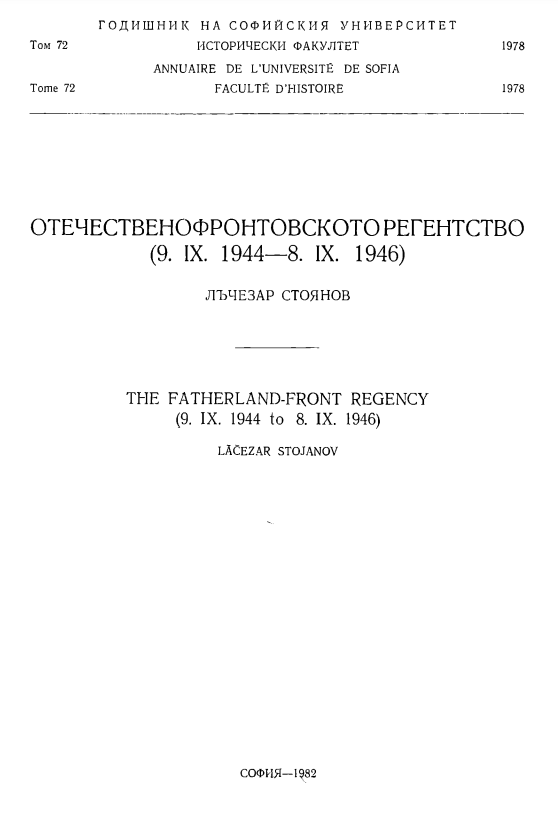The Fatherland Front Regency (9.IX.1944 to 8.IX.1946)
DOI:
https://doi.org/10.60053/GSU.IF.1.72.249-287Keywords:
Regency Council, Political processes, Constitutional violationsAbstract
The present paper treats the place, the role, and the prerogatives of the Regency Council, operating during the early period of the socialist revolution in Bulgaria. The specific character of the revolutionary situation, in which the Regency Council existed, determined the specific character of its activity too. In order to outline these peculiarities of the Council better, the first chapter of this paper treats the prerogatives in the way they are determined by the Constitution of Tarnovo. The same chapter also treats the characteristic peculiarities in the creation and activity of the previous two Regency Councils of 1886 and 1943–1944.
On this basis, the following conclusion is drawn: that in the process of their creation and activity, the statutes of the Constitution have been regularly broken in order to answer the concrete necessities, resulting from the atmosphere in the country and mostly from the international situation. This characteristic feature is most clearly demonstrated during the creation of the third Regency Council on September 9, 1944. The next chapter of this paper treats this problem. It also treats the ideological and practical motives—of the Workers' Party (Communists) first of all—which influenced the creation of a Regency Council once again. The actual prerogatives are considered, as well as the character and the interrelations between this institution and the other authorities. This practically proves the subordination of the Regency Council and the fact that, by its forced passiveness, it helped the revolutionary process in the country.
The last chapter treats the changes in the international situation from the summer of 1945 to the autumn of 1946 and in the inner political life and the reflection of these changes in the character of the Regency Council’s activity. It also treats the attempts of the opposition to restore the rights of the Regency Council according to the Constitution, in order to oppose it to the revolutionary authority in its struggle for the preservation of the social order. The actual authority of the Regency Council in the system of the country’s government is outlined too.
This policy underwent its natural failure in spite of the active support of the USA and Great Britain. With a tremendous majority, the people rejected the monarchical form of governing by the referendum on September 8, 1946. This was one of the decisive steps along the way towards the socialist reorganization of Bulgarian society.
References
Трябва да се отбележат две монографии, в които въпросът за мястото и функциите на отечественофронтовското Регентство са разгледани по-подробно. Първата е на П. Славов, „Българската социалистическа държава" (С., 1975), където на стр. 74 и 75 е разгледана тази институция. Поради краткостта и схематичността на изложението, което не се опира на никакъв изворов материал, авторът достига до основния, но неверен извод, че „Той [Регентският съвет] беше превърнат в революционен орган и служеше на делото на революцията". Далеч по-обемисто и сериозно е изложението в книгата на Яр. Радев, „Държавни представителни органи в България 1944-1947 г." (С., 1965), който на стр. 85-95 разглежда ролята на Регентския съвет. Въпреки своите безспорни достойнства и редица верни изводи, поради правно-историческия подход на изложението, този труд поднася част от изводите в констативен, статичен вид. Тази му особеност се корени и в това, че идейната и политическата еволюция на политическите фактори у нас остават извън полезрението на автора, както и промените в характера на международните отношения, които през този период по редица причини оказват особено силно влияние върху хода на вътрешнополитическото ни развитие. Безспорно за това дава отражение и ограничението на обема на изложението, а също така и обстоятелството, че този въпрос е периферен в търсенията на автора.
Международни актове и договори (1648-1918). С., 1958, r. 157.
И. Димитров. Князът, конституцията и народът. С., 1972, с, 10-11,
Л. Владикин. Регентството като държавноправен институт. С., 1927, с. 28.
Л. Владикин. Регентството... , с. 181-187.
История на България. Т. III. С., 1964, с. 405.
Стеноrр. дневници на XXV ОНС, VI и.с., 3 заседание (9 септ. 1943 г.), с. 17.
Пак там, 4 заседание (11 септ. 1943 г.), с. 20.
ЦДА на НРБ, ф. 84, оп. 1, а.е. 71, л. 8Зоб.
Утро, бр. 10512, 9 септ. 1944 r. Вж. по-подробно и у И. Д и м и т р о в. Буржоазната опозиция в България 1939-1944. С., 1969, с. 207 и 229.
И. Димитров. Буржоазната опозиция ... , с. 207.
К. Георгиев. От началото до победата. - В: Спасителният за България Отечествен фронт. С., 1975, с. 270-271.
Работническо дело, бр. 12, 30 септ. 1944 r.
Изгрев, бр. 76, 4 ян. 1945 г.
Пак там, бр. 95, 30 ян. 1945 г.

Downloads
Published
How to Cite
Issue
Section
Categories
License
Copyright (c) 1982 Лъчезар Стоянов

This work is licensed under a Creative Commons Attribution 4.0 International License.
Annual of Sofia University "St. Kliment Ohridski" - Faculty of History (GSU-IF).







